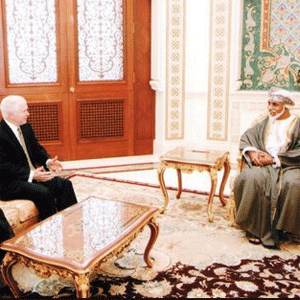What is the reason behind U.S. officials’ successive visits to Oman
Successive visits of Robert Gates and Dick Cheney to Oman has raised questions among political analysts

U.S. Defense Secretary Robert Gates entered Muscat, the capital of Oman in an unannounced visit and met senior officials of this Persian Gulf country a few days ago.
This was the second visit of a high-ranking U.S. official to Oman during the last month with an unrevealed agenda of negotiations. Dick Cheney had visited Oman and discussed regional developments, particularly Iran’s nuclear program and oil price.
Speaking to the press, Gates stated: "The Omanis know that we fully support them. Sultan Qaboos is our close friend and it is highly important for us to keep our good ties with his government and try to reach further agreements". It is not clear what Gates means by "further agreements" but considering his agenda in visiting Oman we can give a guess.
Oman was one of the few countries of the region that was not visited by Gates since he took office as the secretary of defense, though the country hosts some of U.S. most important military and air bases. The country had been one of the key supporters of United States during occupation of Iraq and Afghanistan.
Gates has also stressed that he wants to know Sultan Qaboos’ opinion about the developments of region especially about Iran since the two Middle Eastern countries enjoy warm relations.
Meanwhile a high-ranking official of U.S. Department of Defense remarked that military issues will not be on the agenda during talks with Oman leaders.
What did Gates and Sultan Qaboos discuss?
Despite what the Pentagon official had claimed, in a separate meeting, Oman and U.S. military officials discussed military issues. Ways to improve military cooperation, expanding U.S. military bases in Oman and enhancing Oman’s defense capability especially in its oil-rich regions were the subject of negotiation between military officials of the two countries. The contents of these negotiations have not been announced yet and there’s even no news about the extent of negotiations. But it seems that Iran and United States’ possible options to stop its unfavorable practices have been a part of the negotiations.
Some news resources reported that stricter measures have been proposed by Robert Gates, but rejected by Oman. It has been also said that Sultan Qaboos has even opposed tightening sanctions against Iran. Meanwhile, a senior official of Pentagon that accompanied Gates in his visit to Oman stressed that U.S. still favors the diplomatic solution.
Speaking on condition of anonymity, in his return to Washington he told the press: "Gates has informed Sultan Qaboos that Washington tries to solve its problems with Iran through diplomatic means and this is still United States’ priority."
Being questioned about military measures he said that it was one of the solutions still on the table. According to this official Gates has also told that Iran-U.S. differences are deep and range from Iran’s nuclear plan to Lebanon, Iraq and Afghanistan.
Meanwhile, before Gates’ visit to Oman Radio Sawa affiliated with U.S. Department of State had announced that this country’s role as one of the countries neighboring Strait of Hormoz is one of the issues that will be in Gates’ focus.
Why has Oman become important?
American officials’ visits to Oman had not been so frequent in the recent years, though this Persian Gulf state is one of the major allies of U.S. in Middle East and Persian Gulf and hosts one of the biggest and most important military bases of United States.
Of course this doesn’t mean that Muscat-Washington ties had lost their importance in this period, on the contrary, from another perspective it could be a sign of deepening relations between the two countries, but unexpected visits of U.S. officials in the last month to Oman and extensive negotiations with Omani leaders has raised questions for political observers.
Bush didn’t travel to Oman in his new year’s Middle East tour and he did not even send a message for leaders of the country. This also brought up questions for political observers that led some of them to consider it as a sign that no new war is going to start in the region.
For example in al-Ahram, Fahmi Howeidi the well-known Egyptian analyst, wrote that White House didn’t have any plans for a new military attack in the region, since Bush hadn’t visited Oman, one of America’s most important military and political allies in Middle East.
Oman is important according to political observers because the country has been used as U.S. most important base in its Middle East battles, especially attack on Afghanistan and Iraq. It was from Oman where American rockets were fired towards Afghanistan and Iraq and U.S. fighter planes landed in its airports.
Now the successive visit of two U.S. senior officials, Dick Cheney and Robert Gates, has raised questions for political observers. Is another war on the way? Meanwhile, Gates has also worrisomely reminded Oman’s leaders about their position as the country which lies on the southern coast of the Strait of Hormoz through which 40% of the world’s oil is exported.
According to reports Iran has been the main topic of negotiations between Gates and Sultan Qaboos. However, members of the Cooperation Council for the Arab States of the [Persian] Gulf (CCASG) are unanimous on informing U.S. officials about their opposition against any military strike especially against Iran and Oman is not an exception. Sultan Qaboos has told the U.S. Secretary of Defense that this is the stance of all members of CCASG and they would not withdraw from this stance at all. Still we can not say we certainty whether Gates has left Oman with empty hands or not. While leaving Gates he assured Sultan Qaboos that diplomatic solution is White House’s first option, but other options are still on the table.

